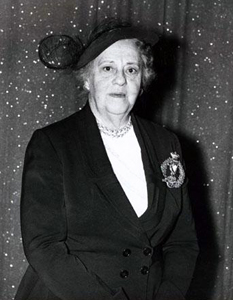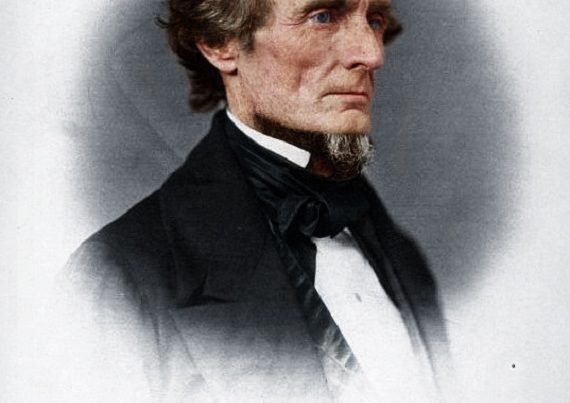Inglis Clarke (20 October 1879 – 30 May 1969) grew up in Edwardsville, Illinois, a small town populated by many displaced Southerners. She had deep ancestral roots in northeastern North Carolina and, particularly, the Albemarle region. Young Inglis’ grandfather, who described the Tar Heel State as “that valley of Humiliation, between two mountains of Conceit,” sparked her interest in North Carolina history.
As a child, she enjoyed reading, debating, and writing novels. In her teenage years, Inglis’ drawing talent led her to study at the St. Louis School of Fine Arts at Washington University. She displayed some aptitude but said she was more interested in marriage than sculpture. In 1902, she married John Fletcher, a mining engineer from Colorado.
Fletcher traveled abroad during her early adult years. Her husband’s work required the couple to move frequently through the northwestern part of the United States.
In 1934, a search for information about her Tyrrell County ancestors piqued her interest in North Carolina’s early years. Interested in her beginnings, Fletcher explored the Colonial Records in Tyrrell County to find information on her ancestors. She spent the next six years researching, writing, and editing her most renowned novel, Raleigh’s Eden, a historical novel about Albemarle plantation families from 1765 to 1782.
The Fletchers moved to North Carolina in 1941 and became deeply committed to their adopted home, attending almost every literary or historical meeting in the state.
Although she was not a native of the state, Inglis Fletcher became one of the most prolific storytellers to write of the early days of North Carolina, which are less known than the comparable periods of Virginia and South Carolina.
She is known for her Carolina Series, a twelve-volume set devoted to the settlement and Revolutionary experience of the Albemarle Sound region. In her writing, the novelist focused on the past and its relevance to the present and the recurrent theme of liberty detailed in man working his land and subsequent generations continuing the tradition. The time span is from Sir Walter Raleigh in 1585 to the ratification debates on the Constitution in 1789.
Fletcher was a firm believer in extensive research for her novels, so committed to accuracy that she would not begin to outline her plots until she was steeped in details of everything from historical events to what people ate and wore. Her common practice was to do research for a year and spend the next year writing.
Fletcher realized that her goal was to entertain, so her novels were filled with action, adventure, and romance. As she wrote in the acknowledgment section of Raleigh’s Eden: “In writing a historical novel the problem is not to turn fiction into fact but to make a fact appear to be fiction.” The author tried to be true to the historical record when offering readers a sense of the past.
When Raleigh’s Eden was published in 1940, it produced significant excitement among readers in the state, who praised Mrs. Fletcher for finally awarding North Carolina what they considered its significant, rightful role in the American Revolution.
Here’s a snapshot of her Carolina Series novels:
Raleigh’s Eden – focused on the causes and events of the Revolution
Men of Albemarle (1942), on the evolution of law and order in the colony during the Queen Anne period (1710–12)
Lusty Wind for Carolina (1944), on the expansion of trade and the elimination of pirates from the coastal waters (1718–25)
Toil of the Brave (1946), on the critical contests of the Revolution and the climactic battle of Kings Mountain (1778–80)
Roanoke Hundred (1948), on Sir Walter Raleigh’s first unsuccessful attempt to plant an English colony in the New World (1585–86)
Bennett’s Welcome (1950), on the migration of permanent settlers to North Carolina down from the James River settlements (1651–52)
Queen’s Gift (1952), on the struggle for constitutional liberties following the Revolutionary War (1783–89)
The Scotswoman (1954), on the Whig patriots’ fight with the Scottish loyalists under Flora MacDonald (1774–76)
The Wind in the Forest (1957), on defining individual liberty as symbolized by the confrontation between Governor William Tryon and the backwoods Regulators (1770–71)
Cormorant’s Brood (1959), on the formation of responsible government in the Albemarle (1725–31)
Wicked Lady (1962), on the last years of the war along the Albemarle (1781–82)
Rogue’s Harbor (1964), on the initial protest of settlers against the irresponsible agents of British officials (1677–89)
The books are, in chronological order of content, Roanoke Hundred, Bennett’s Welcome, Rogue’s Harbor, Men of Albemarle, Lusty Wind for Carolina, Cormorant’s Brood, Raleigh’s Eden, The Wind in the Forest, The Scotswoman, Toil of the Brave, Wicked Lady, and Queen’s Gift.
In 1949, Inglis Fletcher was awarded a Litt.D. degree by the Womans College of The University of North Carolina.
In 1953, Inglis Fletcher was the winner of the Sir Walter Raleigh Award for Fiction for Outstanding Literary Achievement.
Inglis Fletcher received the first North Carolina Award for Literature in 1964, the highest civilian honor given by the state. Her citation read that because of her, “no longer can it be said that our colonial and Revolutionary heroes are unknown; for, within the pages of her books, they have found a new life and a new grandeur.”
Fletcher Hall at East Carolina University, named in her honor, was dedicated on 8 November 1964.
In 1996, she was inducted in the North Carolina Literary Hall of Fame.
I became aware of Inglis Fletcher when I read the book The Old South: 50 Essential Books by Clyde Wilson. When looking over the titles of her books, The Scotswoman grabbed my attention. I then looked at the cover of the book, which also grabbed my attention. I am presently reading the book and am thoroughly enjoying it. Her grasp of the English language is amazing, as is the way she puts sentences and paragraphs together. The intricate details are stunning, and the story flows well. There’s a reason why millions purchased her Carolina Series novels that were translated into seven languages.
Let this sink in: from 1942 to 1964, during what normally would have been her retirement years, Fletcher wrote the final eleven books in the Carolina Series. In 1940, when the first book of the series was published, she was 61. As I read this book and noticed the copyright, 1954, it occurred to me that she was 75 years old. She traveled to Scotland to research. She was 85 when the final book in the series was published in 1964.
In addition to enjoying the book, an added benefit is the writing education: Writing 101. A college professor couldn’t do a better job of teaching writing.
I’m not whistling Dixie when I tell you that if aspiring writers could write 2% as well as Inglis Fletcher, they would be successful writers.
***********
Sources:
https://www.nclhof.org/inductees/1996-2/inglis-fletcher/
https://www.ncpedia.org/biography/fletcher-minna-inglis
https://northcarolinahistory.org/encyclopedia/inglis-fletcher-1879-1969/
https://www.fantasticfiction.com/f/inglis-fletcher/
https://www.thriftbooks.com/series/carolina-chronicles—publication-order/50065/






